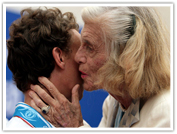|

History
"From a summer camp for people with intellectual disabilities to a World Movement,
the Special Olympics change lives and attitudes for more than 40 years".
Special Olympics is a non-profit organization that was officially founded in 1968, giving form to the vision of it's founder, Eunice Kennedy-Shriver (1921-2009), sister of USA President John F Kennedy. A vision born in June 1962 in a summer camp at Eunice's home, where children and adults with intellectual disabilities were invited in order for her to explore their abilities in various sports activities.
Only two years after the summer of 1968, took place in Illinois in the U.S. the first International Special Olympics Summer Games with 1,000 participating athletes with intellectual disabilities from 26 states of the U.S. and Canada, while in December 1971 Special Olympics received from the U.S. Olympic Committee the privilege to be among the two organizations in America have the right to use the title "Olympics".
From then on until today, Special Olympics have evolved to a Global Movement that offers the opportunity to 3.1 million athletes with intellectual disabilities from 185 countries, mainly through sports, to reinforce their self-esteem, to discover their special abilities, and in this way become active and useful members of their societies.
In the games held every year by the Special Olympics movement in the world, offering the opportunity to take part in more than 30 Olympic-type summer and winter events, participate 550,000 athletes from the US, 500,000 from Europe, 700,000 from China, and 410,000 from India. In Greece, the athletes who participate in Special Olympics events reach 12,000.
Philosophy
"Special Olympics, as a champion for people with intellectual disabilities, teaches our nation – and our world – that no physical or mental barrier can restrain the power of the human spirit.” "
Barack Obama, President of the U.S.A
This commemorative by the President of the U.S.A for Eunice Kennedy Shriver summarize the philosophy of the Special Olympics World Movement.
Namely, the belief that people with intellectual disabilities can, with proper training and support, enhance their individual abilities, enjoy equally with others the joy of sports and prove to society that: IT NEEDS THEM.
Furthermore, modern research efforts conducted since 2001 by the Special Olympics in collaboration with various scientific institutions in the world, as well as forty years of international experience show with facts and figures now that the possibilities offered by the Global Movement for people with intellectual disabilities for participation in sports, social inclusion and demonstration of their competence to society is beneficial for themselves, their families and the communities in which they live, whatever their cultural, religious or other differences.
The mission
"Intellectual disability is further evidence of global diversity. Let us all commit ourselves to the fundamental principles of dignity and equality for all people"
Kofi A. Annan, Secretary General of the United Nations
The mission of the Special Olympics World Movement has the following objectives:
• To inspire peace in the world community.
In a global environment of constant threats of wars, ethnic conflicts and terrorism, the Special Olympics show that people of different races, different cultures and different ages can work together peacefully on common, timeless and above all real social needs. In the 40 years of the Special Olympics World Movement, athletes with intellectual disabilities meet regularly to compete, even if they come from divided nations.
• To change attitudes.
The Special Olympics is the greatest school of humanity, and the athletes of Special Olympics are those who give lessons of competence, acceptance and participation in the field of noble competition of sports.
• To encourage through sports.
For people with intellectual disabilities, the Special Olympics is often the only place where they have the opportunity to develop confidence, to feel the joy of struggle and the acceptance offered even by mere participation.
• To introduce the Special Olympics World Football Games.
The burst of adrenaline. The voices of the players who embrace at the end of the game. The Special Olympics are struggling to convey the unique experience of football to 500,000 people with intellectual disabilities worldwide.
• To develop programs for Global Health.
Through the program "HEALTHY ATHLETES" of Special Olympics, approximately 63,000 people with health specialties are trained each year, working with people with intellectual disabilities and transferring this knowledge and experience to their homelands. Many doctors devoted, after their experiences in Special Olympics competitions, to search practices that improve the living standards of people with intellectual disabilities.
• To encourage research.
Improving the living standards of people with intellectual disabilities requires a comprehensive understanding of what is necessary to be done, and how this can be offered. Since 2001, Special Olympics in collaboration with various universities and scientific institutions around the world carry out continuous research in relation to the beneficial effects of sports to people with intellectual disabilities, their families and the communities where they live.
• To educate the society in relation to how they should address and behave to people with intellectual disabilities.
• To educate the coaches of athletes with intellectual disabilities about the special practices they should use, while developing sports programs tailored to their specific needs.
For more information please visit www.specialolympics.org
|